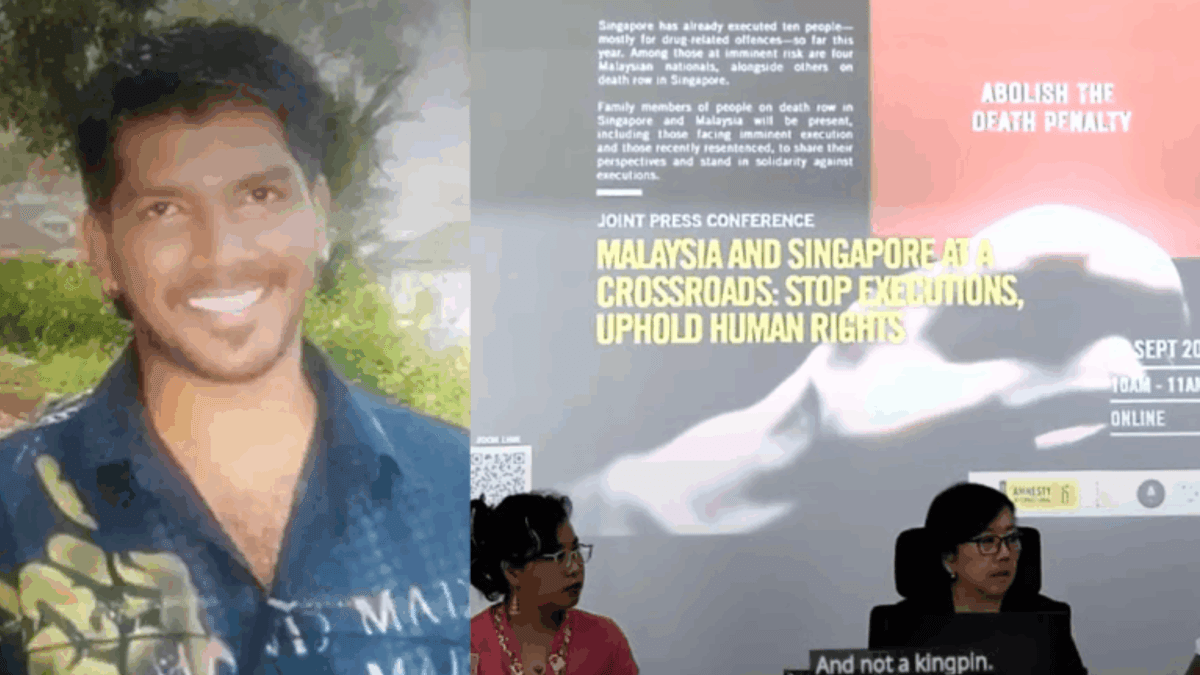Malaysian national to be executed in Singapore this week; case renews debate on death penalty
Malaysian citizen Datchinamurthy Kataiah, 39, is scheduled to be executed at Changi Prison on 25 September 2025 for heroin trafficking. His impending execution — the eleventh in Singapore this year — has reignited domestic and regional calls to abolish the death penalty.

- Malaysian national Datchinamurthy Kataiah, 39, will be executed on 25 September 2025 for heroin trafficking.
- Activists and rights groups renewed calls for Singapore to end capital punishment.
- Malaysia has abolished the mandatory death sentence, with over 1,000 sentences commuted in 2024.
A Malaysian national convicted of heroin trafficking is scheduled to be executed in Singapore this week, in a case that has once again drawn attention to the country’s continued use of the death penalty.
According to anti-death penalty advocates, 39-year-old Datchinamurthy Kataiah will be hanged on Thursday, 25 September 2025, at Changi Prison.
His family received formal notification of the execution on Sunday, 21 September, according to the Transformative Justice Collective (TJC), a Singapore-based advocacy group.
This execution will be Singapore’s eleventh in 2025 and the third involving a Malaysian national this year.
Conviction and legal history
Datchinamurthy was convicted in 2015 for trafficking approximately 45 grams of heroin into Singapore in 2011. Under the Misuse of Drugs Act, the death penalty is mandatory for trafficking more than 15 grams of heroin or over 500 grams of cannabis.
He was first scheduled for execution in 2022, but the sentence was postponed following a constitutional challenge filed by his legal team. The challenge, which questioned aspects of prison correspondence and due process, was ultimately dismissed in August 2025, clearing the way for the death warrant to be issued.
Family and advocacy response
At a joint press conference on Monday, 22 September, held by the Transformative Justice Collective, Amnesty International Malaysia, and the Anti-Death Penalty Asia Network (ADPAN), advocates renewed their appeal for clemency.
During the event, TJC spokesperson Kokila Annamalai read a letter from Datchinamurthy’s sister, Rani, who described her brother as remorseful and reflective.
“He is not protesting punishment,” she wrote, “but he believes that the death penalty is too harsh and extreme for a young man’s naive action.”
Rani has travelled to Singapore to visit her brother before the scheduled execution.
The three advocacy groups, supported by 30 other civil society organisations, issued a joint statement urging Singapore to halt all executions and review its mandatory death penalty laws.
They also highlighted other recent cases involving three Malaysian nationals and one Singaporean who remain on death row after losing their final appeals.
Activists argue that capital punishment disproportionately affects low-level drug couriers, often from impoverished backgrounds, and fails to deter transnational drug trafficking networks.
View this post on Instagram
Broader regional and international context
According to Amnesty International’s 2024 global report, Singapore carried out nine executions in 2023, up from five in 2022, with six taking place within a two-month span. More than 40 individuals are currently believed to be on death row in Singapore, the majority for drug-related offences.
By contrast, Malaysia has taken significant steps away from capital punishment. In 2023, it abolished the mandatory death sentence and allowed courts to impose alternative penalties such as 30 to 40 years’ imprisonment and caning.
Amnesty International reported that Malaysia commuted over 1,000 death sentences in 2024.
Rights advocates have urged Malaysia, which currently chairs the Association of Southeast Asian Nations (ASEAN), to take a stronger diplomatic stance in protecting its nationals facing execution abroad.
They argue that Malaysia’s evolving approach to capital punishment stands in stark contrast to Singapore’s, where authorities continue to justify executions as necessary for deterring drug trafficking.
Singapore’s stance and recent clemency precedent
While Singapore has consistently defended its drug laws as vital for public safety, there has been at least one recent case of clemency.
In August 2025, President Tharman Shanmugaratnam, acting on Cabinet advice under Prime Minister Lawrence Wong, commuted the death sentence of a Singaporean man to life imprisonment — the first such clemency granted since 1998.
Human rights observers say this development suggests some room for reconsideration in exceptional cases, though the government maintains that the death penalty remains an effective deterrent.
Regional advocacy and international reactions
Human rights groups, including Amnesty International and ADPAN, have called on Singapore to declare a moratorium on executions and review its mandatory sentencing framework.
Amnesty’s regional director for Southeast Asia stated, “The death penalty is a cruel, irreversible punishment that has no proven deterrent effect. Singapore’s continued use of executions puts it increasingly at odds with regional and global human rights trends.”
The Asia-Pacific region continues to account for the highest number of executions worldwide, although precise figures remain unclear due to limited transparency in countries such as China, Vietnam, and North Korea.
Public response and upcoming vigil
A public vigil organised by the Transformative Justice Collective is scheduled for Tuesday, 23 September, at 7.00pm at Hong Lim Park in Singapore.
Organisers said the gathering will be held “in solidarity with Datchinamurthy and all those on death row.” Attendance is expected from local and regional human rights groups, as well as family members of prisoners facing execution.
The group reiterated its appeal for compassion and judicial reform, stating that “the death penalty eliminates the possibility of rehabilitation and forgiveness.”
As Thursday’s execution date approaches, advocates have continued to petition for clemency and renewed discussions about Singapore’s capital punishment policy, which remains among the strictest in the world.
View this post on Instagram







